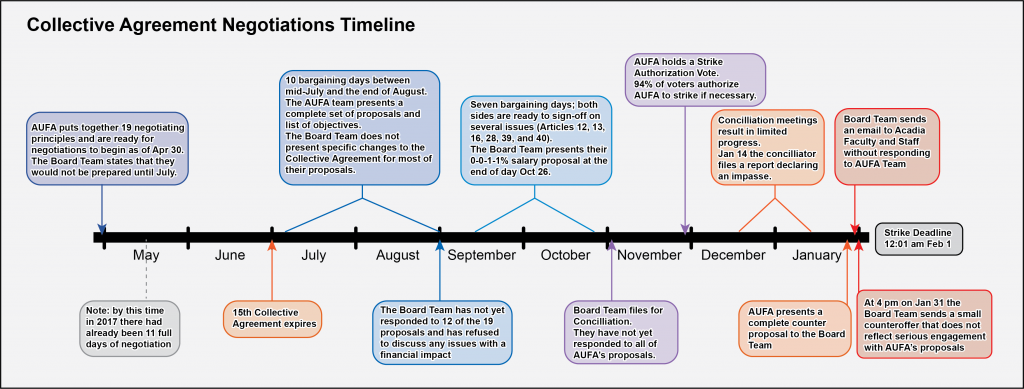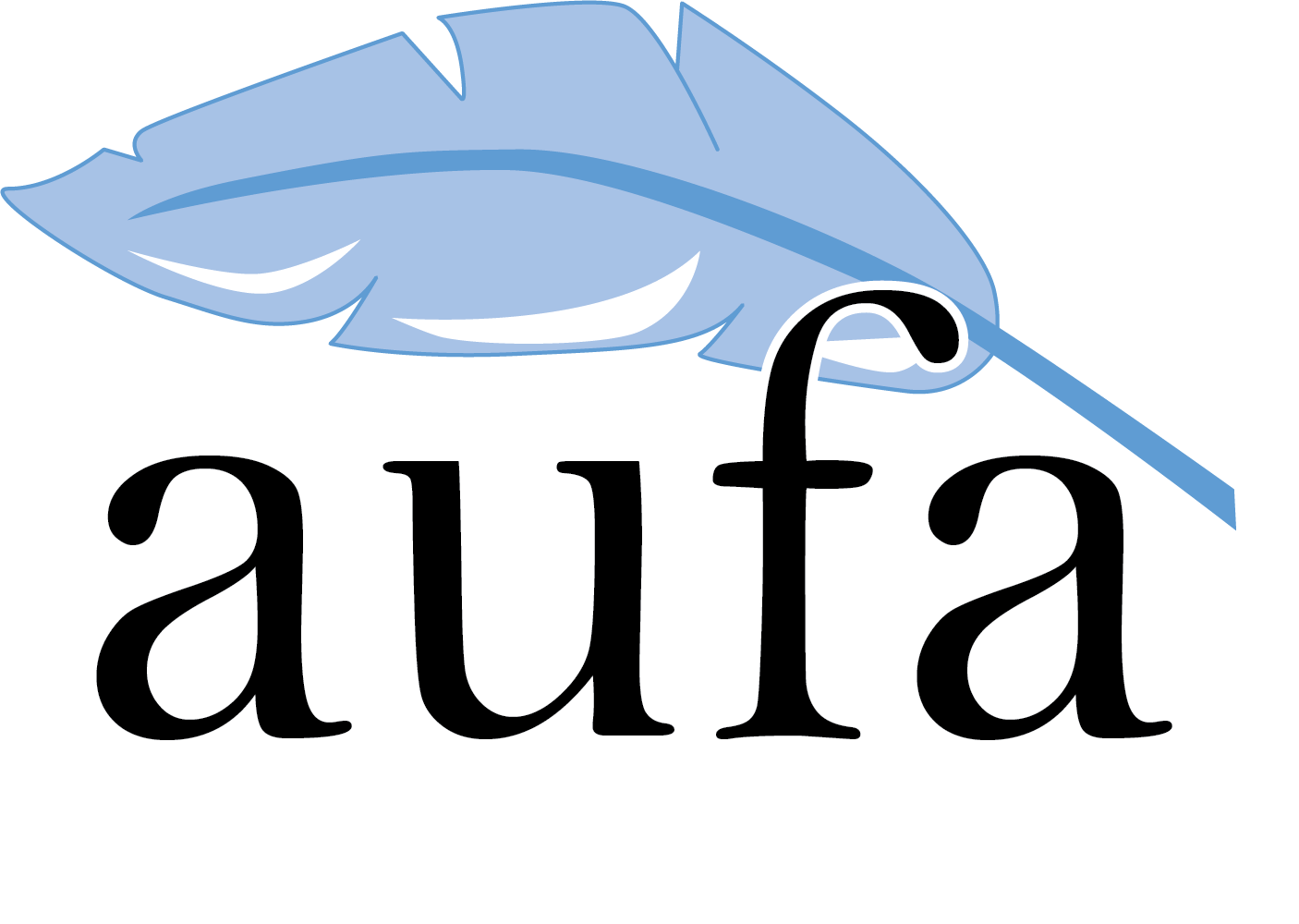Negotiations Timeline
Why is AUFA on strike? This timeline explains AUFA’s work over the last year to avoid a strike and achieve a fair collective agreement.

Preparation for Negotiations
(Fall 2020-Spring 2021)
Fall 2020-Spring 2021
- To prepare for negotiations, AUFA develops a set of bargaining proposals reflecting the interests of its membership.
- The first step was a survey of all members in the fall of 2020. Next, members of the Proposals Committee held 10 roundtable meetings with the AUFA membership in late 2020 and early 2021, as well as dedicated meetings with AUFA committees and its executive.
- The committee consulted with the university’s Indigenous Advisor (Zabrina Whitman), a Mi’kmaq elder (Jane Meader) and with two Indigenous scholars (Dr. Shelly Johnston (TRU) and Dr. Patti Doyle-Bedwell (Dalhousie)) for advice specifically about proposals related to Indigenization. AUFA also received input from various individual members and AUFA committee representatives.
- Using these data, the Proposals Committee put together a series of 19 negotiating principles which were discussed and endorsed by the membership over a series of three membership meetings (March 9, 12, and 18). Following these meetings, a second survey was sent out to AUFA members to prioritize those proposals.
- AUFA’s Chief Negotiator wrote to President Ricketts indicating that AUFA’s negotiating team would be ready to begin negotiations as of April 30.
- The negotiating team representing Acadia’s Board of Governors (the Board team), responded that they would not be prepared to begin negotiations until July.
The Collective Agreement expires on July 1, 2021.
Negotiations
(July – October)
July
- The Board team only offers to meet for 10 bargaining days between July 6 and the end of August. The AUFA team accepts all these scheduled bargaining days, but also makes clear that they are ready to add as many days as needed to reach an agreement.
- The AUFA team presents a complete set of proposals for the Collective Agreement in July.
- By contrast, the Board team presents some proposals, along with a general list of objectives. However, the Board team does not present specific changes to the Collective Agreement for most of their proposals. The lack of specific language around the Board team’s proposals indicates a lack of preparation even though the Collective Agreement has already expired.
- By the end of July, the two sides have only had 4 sit-down meetings and the Board team has failed to respond to most of the AUFA’s proposals and has offered little language or details for its own proposals. The Board team refuses to discuss issues with a financial impact.
This is a dramatic change from what normally occurs with collective bargaining at Acadia. During the last round of negotiations in 2017, the Board team came to the table with many full proposals and by May 18 there had already been 11 full days of negotiations with meaningful discussions on several issues.
August
- The AUFA’s and the Board’s negotiating teams meet 7 times in August.
- Some progress is made on Articles 3 (Employment Equity), 10 (Professorial Appointments), and 12 (Renewal, Tenure, and Promotion), but nothing is finalized.
- By the end of August, the Board team has still not responded to 12 of AUFA’s 19 proposals. The AUFA team has responded to all of the Board team’s proposals. The Board team refuses to discuss issues with a financial impact.
September-October
- Seven meetings are held over the course of September (15, 20, 27) and October (6, 13, 20, 26).
- Progress is made on several smaller issues and both sides are ready to sign-off on several articles, including: 12, 13, 16, 28, 39, and 40. The Board team does not present its proposal on salary until the end of the meeting on October 26.
Conciliation
(November – January)
November
- On November 2, the Board team declares an impasse in negotiations and files for conciliation. This impasse is declared even though the Board team has not responded to many of the AUFA team’s initial proposals that were presented in July.
- To enter conciliation in a strong bargaining position, AUFA holds a strike authorization vote between November 22-25.
Ninety percent of members participate in the strike authorization vote, with 94% of voters authorizing AUFA to strike if it is deemed necessary by the AUFA executive.
December
- Meetings with the Nova Scotia Government appointed conciliator are scheduled for December 13 and 20. The December 20 meeting was eventually cancelled due to challenges related to covid and the rise in the Omicron variant
- For the first conciliation meeting on December 13, the Board team arrives with no proposals. The Board teams offers no responses or counter to any of AUFA’s proposals.
The Board team’s lack of proposals at conciliation occurs even though it was the Board team that declared an impasse and filed for conciliation.
January
- Conciliation meetings on January 5 and 7 result in limited progress.
- On January 14, the conciliator files a report declaring an impasse in negotiations. This sets in motion a 14-day cooling-off period, after which both AUFA and Acadia’s Board of Governors are in a legal position to begin a strike or lockout.
- On January 20, the AUFA executive declares a strike deadline of February 1. This is longer than both the 14-day requirement following the conciliator’s report and requirement for 48 hours notice. This timeframe recognizes the significant work that remains to be done to reach a successful agreement.
- On January 26 and 27, the Conciliator meets with both sides. The AUFA team is ready to bargain and respond to the Board’s proposals and counterproposals, but the Board’s lack of engagement with and response to AUFA’s initial proposals continues and means that minimal progress is made.
- On January 28, the AUFA team presents a complete counterproposal to the Board team.
- On January 29, the Board team offers no response to the AUFA team, but does send an email to all Acadia faculty and staff stating the AUFA team has “still offered no meaningful compromise.” The email accuses AUFA of presenting an “unreasonable number of proposals” and misrepresents items that have been agreed on by the two sides. Nonetheless, the Board team also notes that “The University remains available to meet with AUFA over the course of the next few days to avoid a damaging and ill-timed strike.”
- On the afternoon of January 30, the Board team notifies the AUFA team that they will not be presenting a counterproposal “at this time,” stalling negotiations about 34 hours prior to the February 1 strike deadline.
- At about 4:00 PM on January 31, after 72 hours of waiting for a response and about 8 hours before the strike deadline, the Board team sends a small counteroffer that offers little progress and does not reflect a serious engagement with AUFA’s proposals.
Strike (February 1)
At 12:01 AM on February 1, AUFA goes on strike.
Acadia University is built on the traditional and unceded territory of the Mi’kmaq Nation. We are all Treaty People.
© Copyright 2022 Acadia University Faculty Association | All Rights Reserved | Privacy Policy
